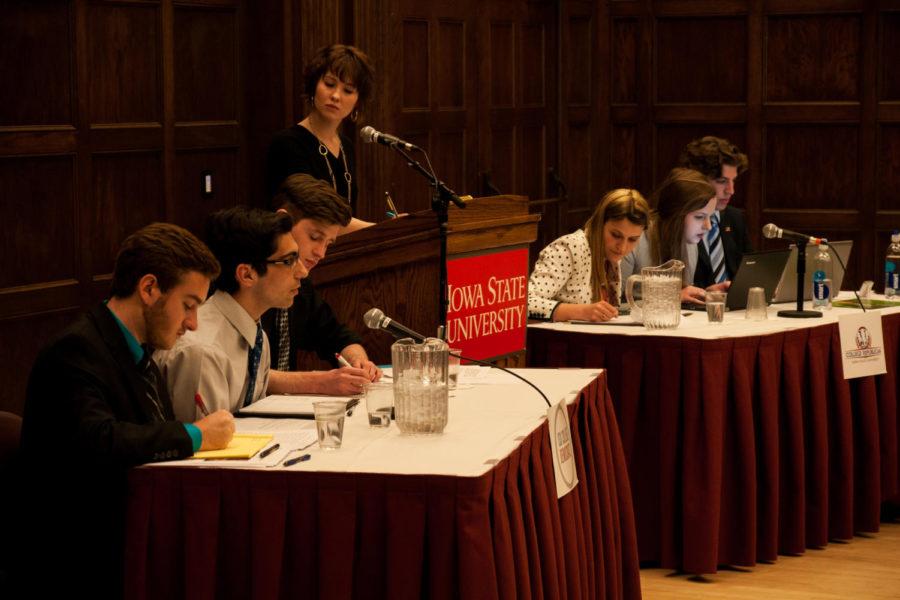Republicans win annual Caucus Cup debate
Caucus debate took place in Memorial Union on April 21, 2015.
April 21, 2015
The ISU College Republicans beat out the ISU College Democrats in this year’s annual Caucus Cup on Tuesday night, a debate sponsored by the Greenlee School of Journalism and Communication for First Amendment Day events this week.
The debate, which took place in the South Ballroom of the Memorial Union with about 200 in attendance, pitted three Democrats against three Republicans on the issue of genetically modified organisms (GMOs) and campaign finance reform.
The Democrats were represented by Zach Rodgers, sophomore in political science; Steven Valentino, sophomore in political science; and Peter Benzoni, senior in computer engineering. The Republicans were represented by Thomas Leafstedt, sophomore in agricultural business; Catherine Leafstedt, junior in agronomy; and Brittany Gaura, sophomore in political science.
Kate Tindall, senior in journalism and mass communication, moderated the event, while Jean Goodwin, professor of English and speech communication, and Kelly Winfrey, lecturer with the Carrie Chapman Catt Center for Women and Politics, judged the event.
Democrats argued for campaign finance reform in their opening statement, saying corporations and Super PACs being able to donate large amounts of money gives them an unfair advantage in election cycles.
“Unlimited spending in campaigns undermines our Democratic process,” Rodgers said, arguing “Citizens United,” a Supreme Court case, is the main factor behind big money in politics.
“America is supposed to be about ‘We the People,’ not ‘We the Corporations,’” Rodgers said.
Republicans argued that the issue of campaign finance comes down to a First Amendment issue. They said anyone with money should be able “to put their money where their mouth is,” which is free speech.
“It’s fitting on First Amendment Day that we argue how we can exercise our rights,” Gaura said.
In rebuttal, Democrats offered that states have implemented laws that make money in politics more transparent. They argued how much money was spent in the 2012 election was a “big” issue, with lots concerned about where big money was flowing in from.
Republicans responded citing several Supreme Court cases where precedent shows laws against spending money — by both individuals and corporations — in politics were ruled as a violation of their First Amendment rights protecting free speech.
In the final rebuttal for Democrats, Benzoni said the amount of money in politics is “ludicrous” and argued that money in politics makes the White House and Congress unaccountable. He also said other countries have moved to pass campaign finance restrictions. They also argued that the majority of Americans are behind the idea of limiting money and said a constitutional amendment would solve the issue.
In the final rebuttal for Republicans, Thomas argued that campaign finance laws that limit money would eliminate transparency on donations. He said money will continue to flow into politics, but it will be under the table and you will not know where it is coming from.
Judges questioned both sides after each round. Goodwin asked Democrats about limiting speech by media corporations like the New York Times. She asked Republicans if they were concerned that someone with “100 million times” more money than her could influence outcomes in elections.
“The First Amendment guarantees free speech, but it does not guarantee equal speech,” Catherine said in response.
On the issue of GMO labeling, Republicans were first with their opening statement and argued against labeling.
“We strongly oppose mandatory labeling,” Catherine said, arguing regulations that require labeling would cost an overwhelming amount of money that would be passed onto the consumer.
Democrats also argued against labeling, though they discussed the technology behind GMOs and said big agriculture corporations limit smaller farmers’ role in the market.
“It is not in the position of the Democratic Party to require labeling, nor is it the position of the ISU Dems. I mean, hell, we’re an Ag school!” Benzoni said to a few laughs.
In rebuttal, Thomas argued for the Republicans and read the official Democratic Party of Iowa platform, which states they support new regulations on GMOs. They also rebutted the idea that using pesticides was harmful to the environment.
In the Democrats’ rebuttal, Rodgers said he was arguing the national Democratic Party, not the Iowa Democratic Party, which may have more agriculture issues included in their party platforms. They also reaffirmed they support GMOs, but also voiced support for more transparency in how big agriculture companies handle agriculture issues.
In their final rebuttal, Catherine argued for Republicans that Democrats have conceded in the debate about the labeling and focused on “corporate responsibility.” Democrats responded and clarified that the ISU Democrats do agree with not requiring labeling. They then focused on agriculture companies, such as Monsanto, keeping smaller companies out of the market.
In the end, the judges deliberated for several minutes, but ultimately chose Republicans as the winners. Winfrey said one of the biggest factors in their decisions was she thought Democrats often abandoned the topics being discussed and went off-topic, but Republicans were able to still make their arguments with the off-topic discussions.
As the winners, Republicans will now hold the Caucus Cup until next year’s debate.







